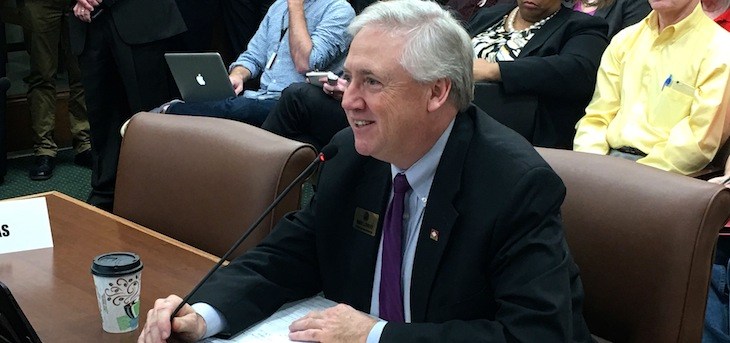Voter ID bill passes committee, will need two-thirds vote in the Arkansas House
by January 25, 2017 2:42 pm 710 views

A bill requiring voters to present a photo identification at the polls passed a House committee Wednesday.
House Bill 1047 by Rep. Mark Lowery, R-Maumelle, was approved by the House Committee on State Agencies and Governmental Affairs on a voice vote. It now goes to the full House, where it would need a two-thirds majority to pass because it amends the Arkansas Constitution’s Amendment 51, which governs the registration of voters.
Lowery told reporters he is confident he has the votes in the House. He said he is “fairly confident” the bill has sufficient Senate support, though it may take time to poll the members because a voter ID-related constitutional amendment could be filed.
The Legislature in 2013 passed Act 595, which also required voters to present a photo identification at the polls, but it was struck down by the Arkansas Supreme Court. Former Justice Donald Corbin wrote in his majority opinion that the measure added a qualification to voters that is not included in the Constitution. Justices Courtney Goodson, Karen Baker and Jo Hart, all of whom are still on the seven-member court, offered a concurring opinion based on the fact that the amendment was not passed with a two-thirds majority. They did not rule on the qualification issue.
In presenting his bill, Lowery said he is seeking a two-thirds majority and that, to address the voter qualification issue, the bill explicitly refers to voter registration. He said it would allow for “dramatically” more types of photo identifications than the 2013 law.
“This has been crafted very carefully to make sure that we’re not adding a qualification to voting, that we are really just clarifying the voter registration process,” he said.
Following the passage of Act 595 in 2013, the secretary of state provided equipment to counties to allow voters to receive a free photo identification. That equipment was collected and can quickly be disbursed to counties, Lowery said. Danielle Fusco, spokesperson for the secretary of state’s office, later said not every county provided all the working pieces, so some of the sets are not in working order.
Among the bill’s other provisions, residents of long-term care facilities would be exempt if the facilities’ administrators vouch for their identity. Those who are indigent or who have religious objections to having their photo taken also would be exempt. Voters who arrive at the polls without an ID would be able to cast a provisional ballot and return to the county clerk or the county board of election commissioners by noon of the Monday following the election and have their vote counted. Absentee voters would have to provide a copy of an identification with their ballot.
Lowery was asked about that qualification issue by Rep. Michelle Gray, R-Melbourne, a co-sponsor, and Rep. Warwick Sabin, D-Little Rock, who voted against it. Gray asked if a voter-approved amendment would be necessary. Lowery said if legislators do refer such an amendment, nothing could change until at least 2020.
Sabin argued that a photo identification is indeed a voter qualification.
“Why are we asking people to do one more thing simply to exercise that fundamental right that they have as a citizen of Arkansas and a citizen of the United States of America?” he asked.
Lowery said he had been asked if the bill is a solution in search of problem, as there is no evidence that voter fraud is a widespread problem. He said the data is difficult to collect. Instead, there is mostly anecdotal evidence, such as a friend of Rep. Bob Ballinger, R-Hindsville, who went to vote only to learn someone had used her name to vote elsewhere. Lowery said he was not going to focus on the issue of widespread fraud and later told reporters he did not necessarily believe such fraud occurred in the 2016 elections.
“Whether it’s rampant or not, take it from somebody who in my first election I won by nine votes, even if there is just a handful of electoral fraud, it can totally turn an election,” he told reporters.
The real problem, he told legislators, is “eroding lack of confidence in the electoral process by the American people,” which he said is a threat to democracy. He said Arkansas scored poorly on a study by the Electoral Integrity Project regarding its electoral laws and voter registration.
“This is one way to proactively address the confidence issue,” he said.
He later told reporters that 18-year-olds automatically should be registered to vote. He referenced a 2016 Gallup poll showing 80% of Americans support voter ID laws, with similar support among white and nonwhite voters. He said voter IDs are required for many activities of daily life, including boarding a plane, renting a movie, or touring the White House.
“There are so many elements in everyday life that we require this, why not it (be) required also to maintain the integrity of the ballot?” he said.
Speaking against the bill was Warren Searls with AARP Arkansas, who said the bill would place impediments in the way of people voting and that some people could not easily travel to their county seats to obtain a photo identification. He said his organization includes 300,000 members.
Legislative supporters of the bill were not swayed, asking him pointedly if his views represented all of his members. He said he did not know what all of their views would be.
Legislators voted to close debate before hearing from the Arkansas chapter of the American Civil Liberties Union. Holly Dickson, ACLU legal director, said the bill is “the same law as before, and we can call it a voter registration requirement all we want, but it applies to people when they go to vote, so it’s a qualification for voting.”
